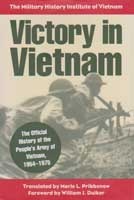The reader should be warned that this is not an easy book to read. Already on the back flap it is explained why the "triumphant flavor" is retained - just in case we'd start suspecting that the author is trying to bury us alive in purple prose. To the point: This is North Vietnamese propaganda, faithfully translated into English.

Victory in Vietnam
The Military History Institute of Vietnam, Merle L. Pribbenow (translator) and William J. Duiker (foreword)
ISBN: 0700611754
University Press of Kansas, 2002-03
English
Heavy-handed propaganda, but treated as such it offers a great insight in how the war was seen from the North Vietnamese side. (4/5)
Even so, however, there is value in the book, because it is the definitive statement from the PAVN[1] on the war. One must therefore approach the book not as an attempt to objectively explain what happened on the Communist side of the Vietnam war, but as a way to understand what the Vietnamese Army wants others to think of them. Interspersed in this are some facts that would never have been known if it weren't for this book. For example, that four PAVN regiments were operating in South Vietnam in 1965 when the first US ground forces landed, or that their infiltration of the south had begun in 1959.
It is thus more as a source for scholars that this book shines. The prose is heavy, with chapter titles such as The Ho Chi Minh Campaign: The People's Army and the Entire Nation Fight the Decisive Battle to Liberate Saigon and the Provinces of Cochin China, Bringing the War against America to Save the Nation to a Glorious Conclusion
- and the style isn't limited to the titles. As for the factual content of the book it is not worth mentioning in a review. Since this book is so obviously propaganda, there is no need to get bogged down in refuting the myriad of assertions it makes. Such work would not only require extensive research that is far beyond the scope of this review, even if every single factual assertion in the book that could be proven false were proven false there would still be the issue of the tone of the book, and of the facts that are omitted.
I'll give an example of the problems: There is a claim of having shot down 34 B-52s[2], where other historians claim that the number is 30[3]. Maybe some historian considers the difference significant, but I can't help but see it as a consequence of the general confusion of battle. However, in the surrounding text, American pilots are referred to as sky pirates
, quotes emphasizing the heroism of the Vietnamese defenders abound, and apparently World opinion called this battle a "Dien Bien Phu[b] in the skies"
, a quote I have not been able to find anywhere outside of Vietnamese sources.[4]
What can be made of this? The number of B-52s shot down is contested - but we can certainly draw the conclusion that the PAVN considers this battle a very big victory, and would like us to think so as well. Noting that the US would send in over a hundred B-52s in a single attack, of which there were many, whether you count the 30 losses or the several hundred B-52s that dropped their bombs and returned becomes a matter of what you want to emphasize. For contrast, here is the Wikipedia description of the situation at the last day of the battle, showing the success of the bombing: By the eleventh and final day (29 December), there were few strategic targets worthy of mention left within North Vietnam.
[5]. And so it goes, page after page you read the North Vietnamese description of events, the way they describe it - then you compare and contrast it with another source and see. The knowledge doesn't come from the book, it comes from comparing it to other sources.
To summarize: This book is heavy-handed propaganda. But treated as such, it offers a great insight in how the war was seen from the North Vietnamese side. Even if it makes for an atrocious read, it is one of the most important books written about the war, and as a source for researchers it shines at its most brilliant. But easy reading it ain't, and unless you possess encyclopedic knowledge of the Vietnam War, you don't want to read it without having your reference books within reach.
I'll close with a quote from David Drake. I recommend that you follow the link and read the quote in context:
[T]he NVA would fight only when they considered themselves to be strong enough to win.
The only way we could succeed was for the enemy to give up. Given that they had been fighting since 1945 already, it was unrealistic to expect them to give up now.
The instructors kept repeating the official line: that we could win through technology... but we Spec 4s were right and they were wrong. Everything I saw In Country and everything I've read in the memoirs of other veterans reinforces what my class knew at the time.